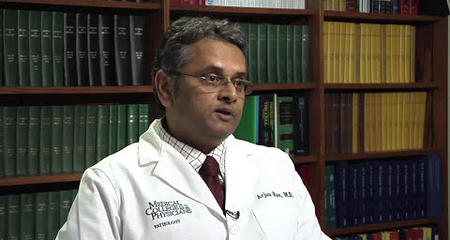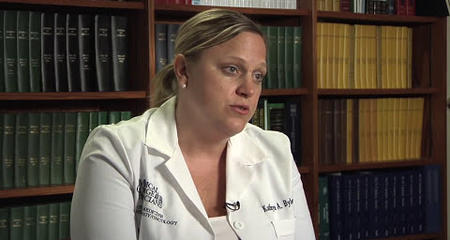Testicular cancer has the best prognosis of any solid tumor. In general, more than 95 percent of patients with cancer of the testis can achieve a long-term cure. Even after the cancer has spread beyond the testicles, men who receive the right treatment from urologic cancer specialists who have expertise in treating the disease have a good chance of long-term survival.
Testicular cancer is most common in men in their 20s and 30s. In the United States, about 8,500 new cases of the disease are diagnosed every year. There are two main kinds of testicular cancer — seminoma (a slow-growing cancer) and nonseminoma (which tends to grow and spread more quickly).
Testicular cancer is diagnosed through blood tests, ultrasound examination of the testes and pathological examination of surgically removed tissue.
Testicular Cancer Treatment
The different types and sub-types of testicular cancer often require very different treatment approaches. In the Prostate and Urologic Cancer Program, medical oncologists, radiation oncologists and urologic surgeons work together to develop a treatment plan tailored to the type and extent of the patient’s tumor.
Surgery
Almost all patients with testicular cancer require the surgical removal of the affected testicle. For men with cancer in both testes, surgeons are sometimes able to remove just the cancerous part of the second testicle.
Organ preservation is important in the treatment of testicular cancer — to preserve fertility but also to maintain testosterone production. Men who lose both testicles require long-term androgen replacement therapy to maintain normal levels of testosterone.
Chemotherapy Options
Over the last two decades, advances in chemotherapy have helped improve testicular cancer cure rates dramatically. It is important for patients to be treated by medical oncologists who specialize in urologic cancers and treat a high volume of testicular cancer patients. While testicular cancer can be treated very successfully with chemotherapy, there are precise treatment guidelines for developing an effective regimen.
- Chemotherapy drugs used in various combinations are available to treat testicular cancers that have spread to other parts of the body as well as cancer that has recurred following prior treatment.
- Some patients who do not respond to conventional treatments for testicular cancer may benefit from high-dose chemotherapy combined with bone marrow transplant. Learn more about our Blood and Marrow Transplant and Cellular Therapy Program.
Radiation Therapy
Seminoma tumors are very sensitive to radiation, and patients with this form of testicular cancer can benefit from radiation therapy. Following testicle removal surgery, external beam radiation delivered to the abdominal lymph nodes can help prevent cancer spread. Newer approaches to radiation therapy for seminoma may allow patients to receive a lower total radiation dose.
Virtual Visits Are Available
Safe and convenient virtual visits by video let you get the care you need via a mobile device, tablet or computer wherever you are. We’ll gather your medical records for you and get our experts’ input so we can offer treatment options without an in-person visit. To schedule a virtual visit, call 1-866-680-0505.





